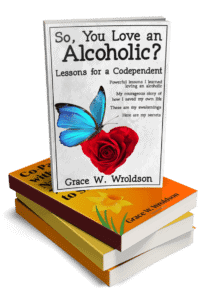Are You Being Lied to by the Alcoholic?
3 Things To Do If You Are Being Lied to by an Alcoholic
Subtle and Blatant Lies in Relationship Abuse
I was in a toxic relationship for fifteen years with an alcoholic full of non-truths lurking under the surface. Actually, the subtle relationship abuse centered around all of his lies. (And the various ways he lied to me.) Pay attention to the “quiet lies” — the lies by omission or the lies happening through non-disclosure of the truth.
I realize in hindsight, the lies about who he really was were even more important than the fibs he told to me. I learned that it’s abuse when someone makes you question your reality. And more so, it’s abuse when they distort your version of your truth. You can even start to go insane if you can’t apply more denial to it. Having cognitive dissonance is actually psychologically painful. I found that the confusion created by his lying was painful and mentally disturbing.
That’s why I say that I was abused by lies. What’s more? I let the lies keep me on his “hook.” What’s worse is that? My codependency lied to me, too. It told me that I couldn’t live without him. It said that I loved him too much to ever let go. So, in a sick, strange way, I was abused by my love for him!
Realizations Through Relationship Abuse Recovery
By committing to my own health and recovery, I learned to love myself more than I loved him. I started telling myself the truth. Truth broke the spell of all the lies I lived under. These changes I made, this shift in me, threatened how he controlled me through the lies and through my love for him. It was crazy how there were lies that he didn’t say directly to my face — all the while claiming to be the most honest man that I will ever find. Ha! I realized that lies were a subtle way to control me in that emotionally abusive relationship. Basically, it was pure deception. That being said, my denial was just as deceptive to me.
Later, I learned that he wasn’t just an alcoholic… he was also a covert narcissist! From that, I also realized that’s how his personality functions: without a conscience or the ability to connect to another’s pain or experience. It’s called a personality disorder for a reason. The selfishness of lying was just a sign of his much deeper problem. I can understand how, without a moral compass to guide a person, without connection and empathy, lies are easy to tell since they don’t affect the liar on the spot. Sadly, he “got away” with man things by lying. Even sadder, his lies affected me negatively for decades. When I believed the lies, it was like I ingested them and got sick from swallowing them. It’s interesting how negative/dark energy works. To heal, I learned to “spit them out,” eject them from my reality and speak back.
Through my own research, I discovered that often, alcohol use disorder/alcoholism is just a symptom of another dysfunction — my sponsor in a program that I attend has told me this many times. It turns out that my ex, the alcoholic whom I loved, had other core issues besides the drinking. Today, I don’t take it personally anymore, knowing that he has a personality disorder that he suffers from too. Instead, I focus on healing my own codependency. That has made all the difference!
Looking at Myself: My Own Disorder
For me, the fact that I was tied, attached, and hanging onto an alcoholic so desperately was a sign of my own underlying disorder: codependency. Couple that with some love addiction, and you could see me as a woman who was putting up with an abusive alcoholic, year after year, and justifying it to myself while continuing to get sicker and sicker.
My self-esteem was shattered when I hit what I call my “codependent bottom.” The only way that I could get well was to break the “codependent spell” and turn to myself for healing. I needed to stop looking to him to give me the happiness that I wanted. Bottom line: I couldn’t have a healthy relationship with an unhealthy man. I also couldn’t be in a healthy relationship if I was going to deeply attach to another person and lose myself completely. (Read my Tough-Love Blog)
Are You Lying to Yourself?
It turns out that there are numerous ways to be lied to, including ways we lie to ourselves. Gaslighting is one form of perpetuating a lie, and so is denial. These things keep lies alive and going. It’s important to stop them in their tracks so that they don’t take root and cause you to develop a warped justification for them. Being buried under a pile of lies is no way to live. Actually, I consider it a soul-starvation.
Here are 3 things to do if you are being lied to*:
- If it’s safe: Share these lies with a safe/confidential friend, therapist, or domestic violence worker (this halts any gaslighting effects or denial tendencies). By acknowledging them, you have less of a chance to slip into denial. You also have a chance to fully examine the lie and why it was told.
- If it’s safe: Document the lies (privately/safely) so that you don’t forget what you are dealing with (Caution: Please keep this out of reach of the liar for your safety!) Writing them down solidifies your experience. Validating your truth is key to preventing self-betrayal. I learned that codependents in their sickness not only self-sabotage but also self-betray and turn on themselves. I find this to be scarier than being in denial. If we want to heal and be happy, we have to make sure that we aren’t abusing ourselves!
- Consider how you might be lying to yourself! Can you see where you may be lying to yourself and not living openly and honestly in the light of truth? Ask yourself, “What have I been lying to myself about?” Answer this honestly.
Special Note: Healing from lies is a process. It takes recovery, supportive therapy, a safe community of others who live in the light of truth, and time to be able to handle heavy doses of truth. Please take your time and reach out for individual support. (Need a place to start? Read my chapter on Common Sense Crisis in So, You Love an Alcoholic?: Lessons for a Codependent)
Learn more of my powerful insights in my book! Click Here.
—Grace W. Wroldson, mother, author, survivor, and thriver of 5 self-help books available on Amazon
Website: GraceWroldson.com
Post to our private community what you learned from this post on Facebook. We would love to hear from you!
Join my private FB Group
Book a private coaching session with the author? Click Here.
Books available on Amazon and Audible!

So, You Love an Alcoholic?: Lessons for a Codependent – Book Available on Amazon
To learn 25 more powerful lessons, pick up my first book! So, You Love an Alcoholic?: Lessons for a Codependent
For follow-up lessons to learn, buy my second book! I Loved an Alcoholic, But Hated the Drinking: 11 Essential Strategies to Survive Codependency and Live in Recovery with Self-Love
Stay in touch! Get my FREE tips, tools, and tricks—plus valuable survivor wisdom!
**Disclaimer: These are helpful tips based solely on the author’s thoughts and opinions. The author is not a qualified mental health professional nor a crisis caseworker. She cannot give legal advice or appropriate counsel and is therefore not liable for any injury or harm to readers. Please follow your doctor’s, therapist’s, counselor’s, and lawyer’s advice, as well as your own good common sense and intuition based on your unique circumstances—to see if these tips could be helpful. Also: Child custody situations may vary where some of these will not be applicable for your circumstance. Furthermore, court orders may dictate otherwise. Please use your own good judgment when reviewing this blog. This is for personal self-help only. These were created from the author’s own lived experience and not based on any therapy principles, best practices, laws or rules of the courts. This is copyright protected by the author and is not to be sold, distributed, or quoted without the author’s written consent.


